Module 5 Cartoons.课后辅导复习课件(共36张PPT)
文档属性
| 名称 | Module 5 Cartoons.课后辅导复习课件(共36张PPT) | 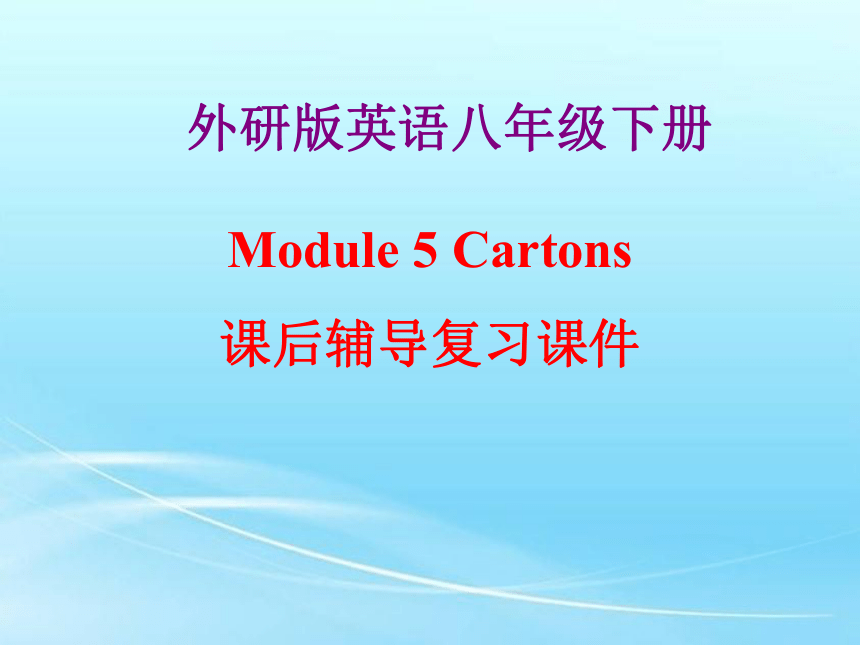 | |
| 格式 | ppt | ||
| 文件大小 | 1.4MB | ||
| 资源类型 | 试卷 | ||
| 版本资源 | 外研版 | ||
| 科目 | 英语 | ||
| 更新时间 | 2022-05-19 21:14:36 | ||
图片预览

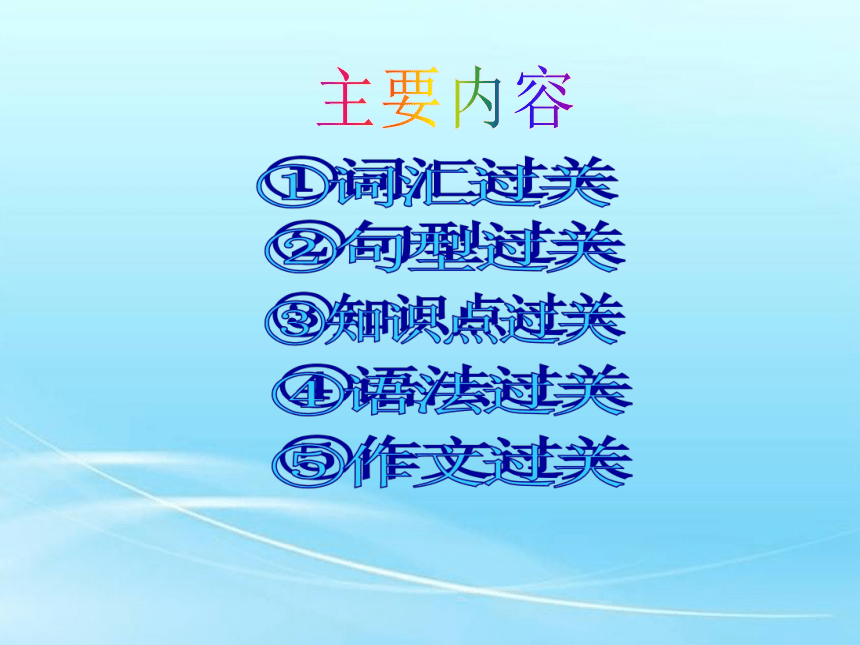
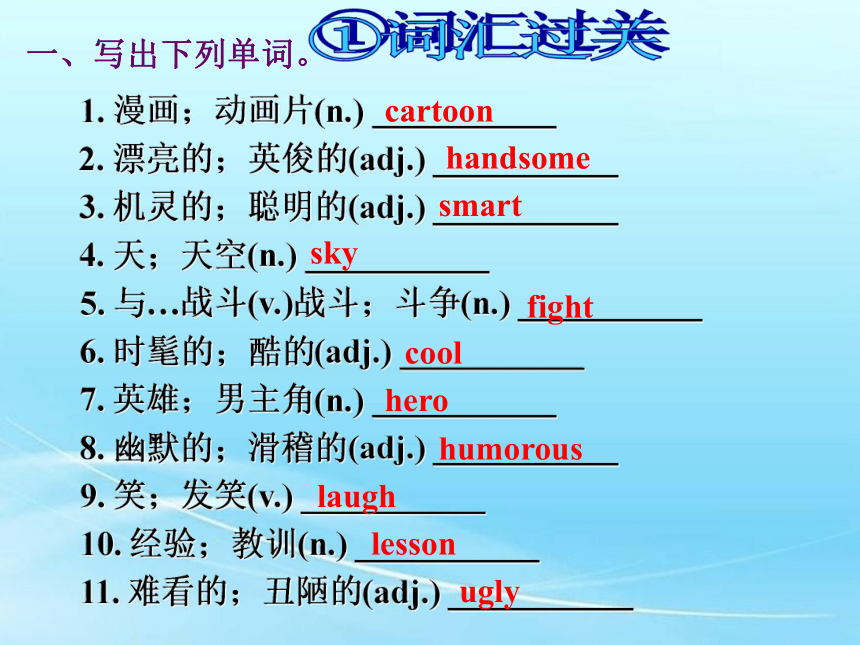
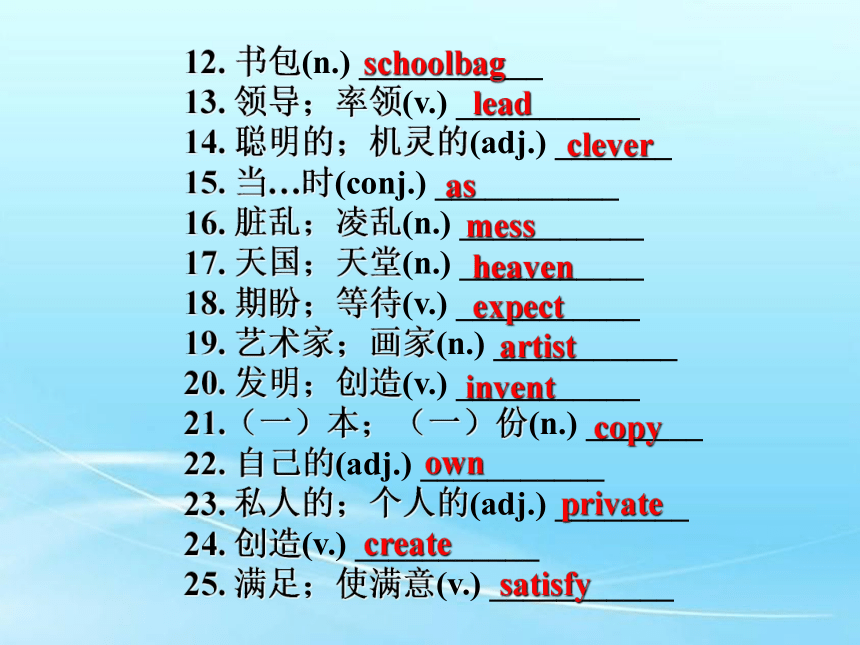
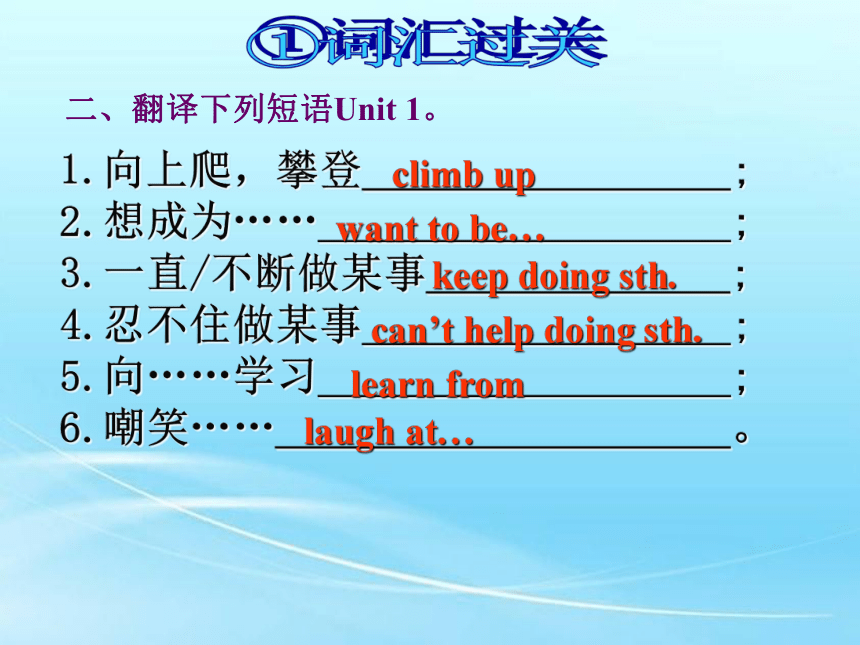
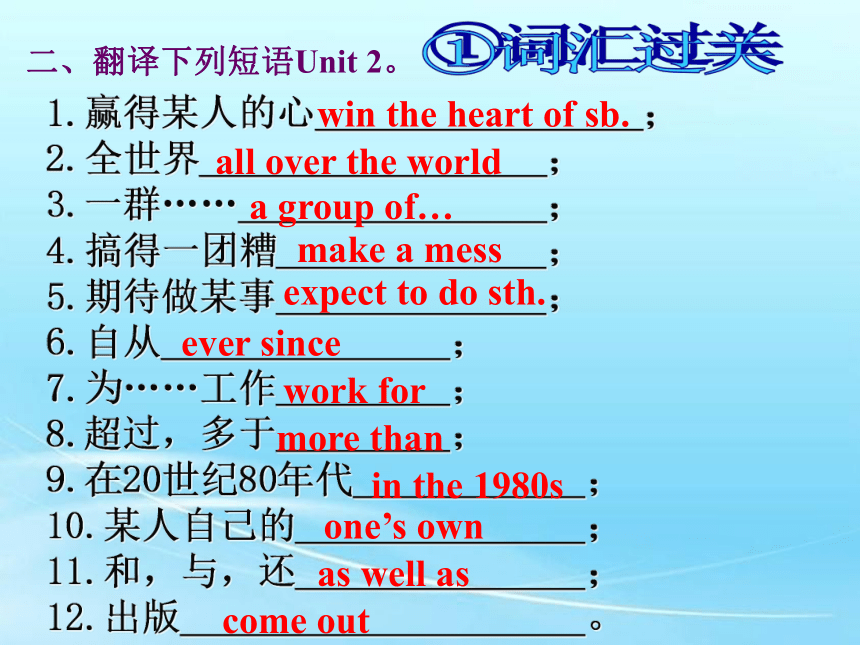
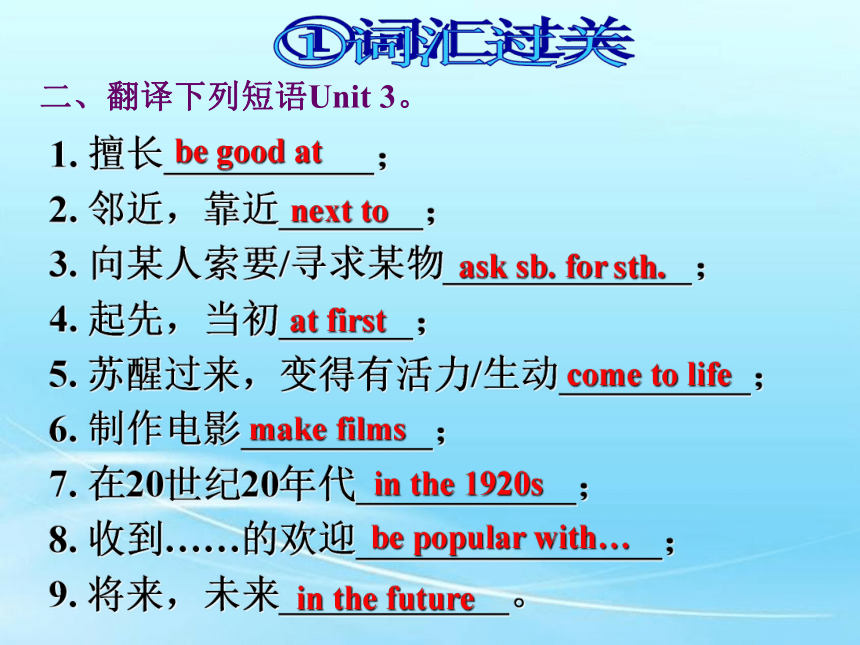
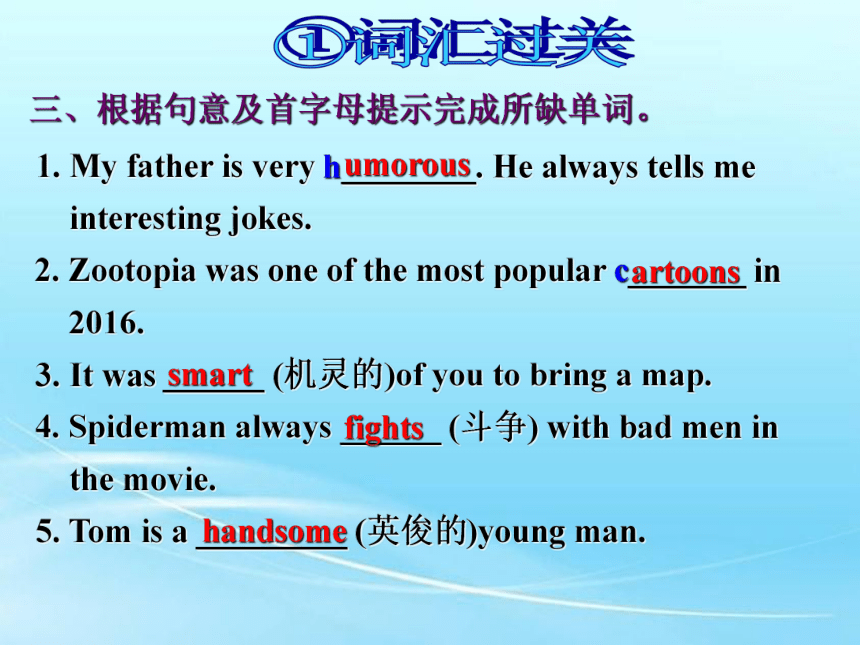
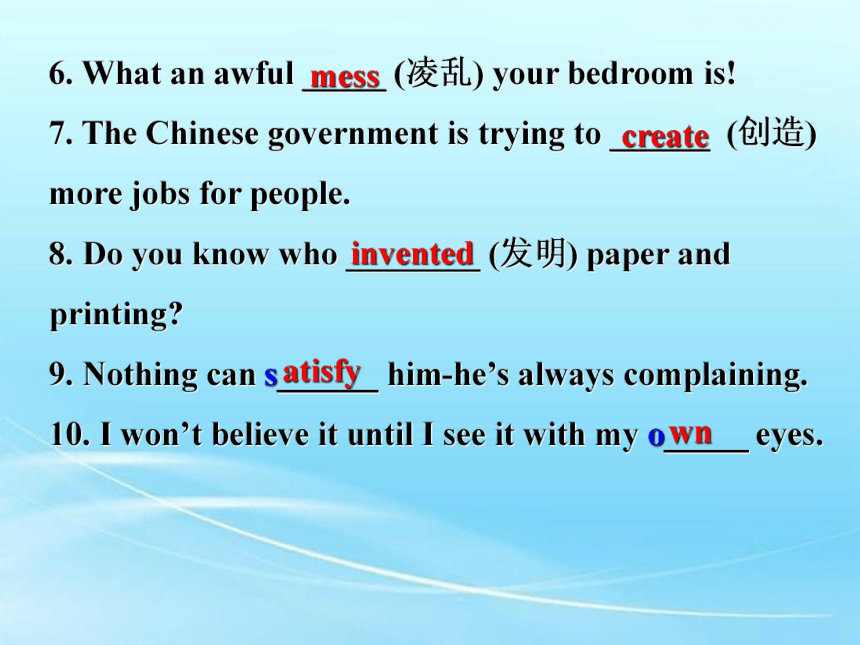
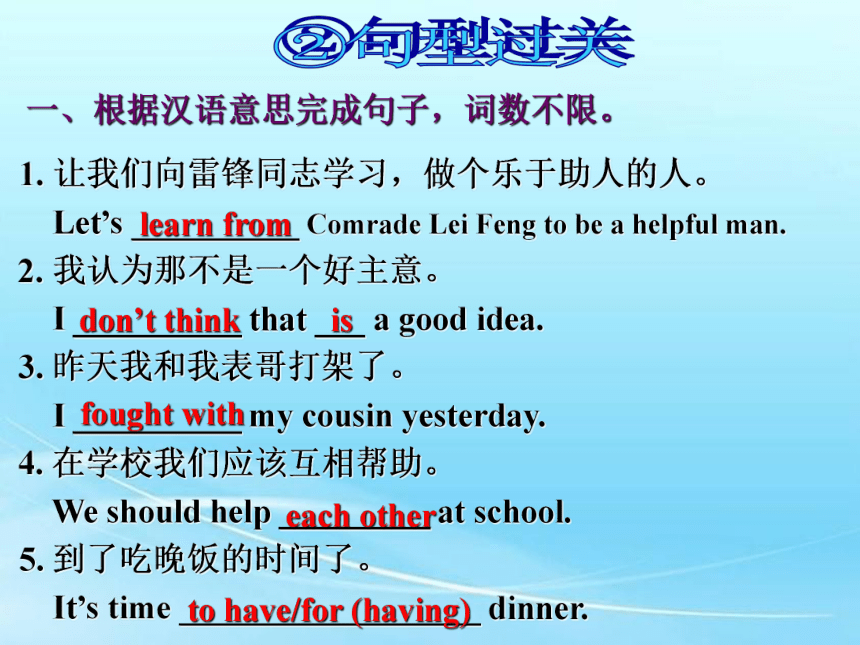
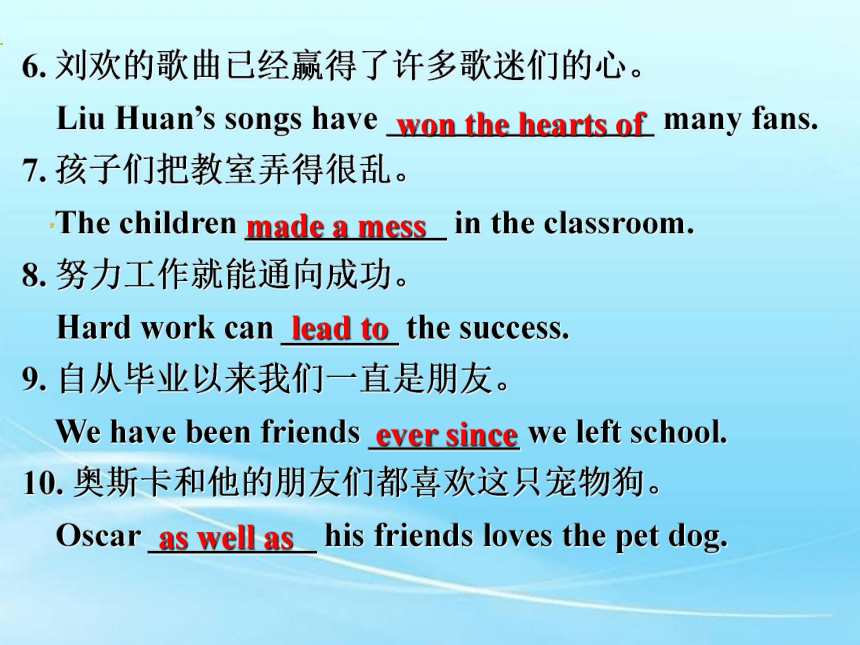
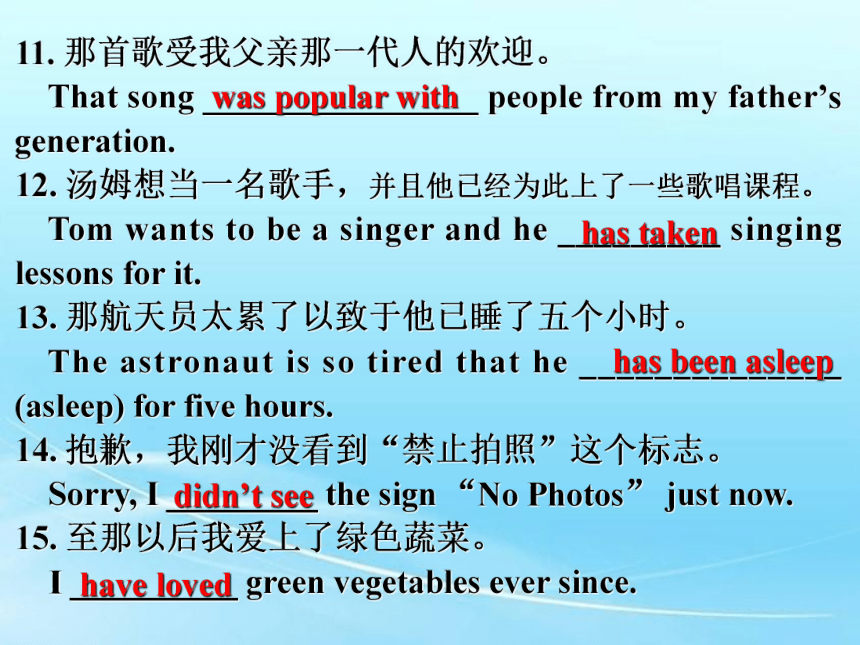
文档简介
(共36张PPT)
外研版英语八年级下册
Module 5 Cartons
课后辅导复习课件
一、写出下列单词。
1. 漫画;动画片(n.) ___________
2. 漂亮的;英俊的(adj.) ___________
3. 机灵的;聪明的(adj.) ___________
4. 天;天空(n.) ___________
5. 与…战斗(v.)战斗;斗争(n.) ___________
6. 时髦的;酷的(adj.) ___________
7. 英雄;男主角(n.) ___________
8. 幽默的;滑稽的(adj.) ___________
9. 笑;发笑(v.) ___________
10. 经验;教训(n.) ___________
11. 难看的;丑陋的(adj.) ___________
cartoon
handsome
smart
sky
fight
cool
hero
humorous
laugh
lesson
ugly
12. 书包(n.) ___________
13. 领导;率领(v.) ___________
14. 聪明的;机灵的(adj.) _______
15. 当…时(conj.) ___________
16. 脏乱;凌乱(n.) ___________
17. 天国;天堂(n.) ___________
18. 期盼;等待(v.) ___________
19. 艺术家;画家(n.) ___________
20. 发明;创造(v.) ___________
21.(一)本;(一)份(n.) _______
22. 自己的(adj.) ___________
23. 私人的;个人的(adj.) ________
24. 创造(v.) ___________
25. 满足;使满意(v.) ___________
schoolbag
lead
clever
as
mess
heaven
expect
artist
invent
copy
own
private
create
satisfy
二、翻译下列短语Unit 1。
1.向上爬,攀登 ;
2.想成为…… ;
3.一直/不断做某事 ;
4.忍不住做某事 ;
5.向……学习 ;
6.嘲笑…… 。
laugh at…
climb up
want to be…
keep doing sth.
can’t help doing sth.
learn from
二、翻译下列短语Unit 2。
1.赢得某人的心 ;
2.全世界 ;
3.一群…… ;
4.搞得一团糟 ;
5.期待做某事 ;
6.自从 ;
7.为……工作 ;
8.超过,多于 ;
9.在20世纪80年代 ;
10.某人自己的 ;
11.和,与,还 ;
12.出版 。
win the heart of sb.
come out
all over the world
a group of…
make a mess
expect to do sth.
ever since
work for
more than
in the 1980s
one’s own
as well as
二、翻译下列短语Unit 3。
1. 擅长 ;
2. 邻近,靠近 ;
3. 向某人索要/寻求某物 ;
4. 起先,当初 ;
5. 苏醒过来,变得有活力/生动 ;
6. 制作电影 ;
7. 在20世纪20年代 ;
8. 收到……的欢迎 ;
9. 将来,未来 。
be good at
next to
ask sb. for sth.
at first
come to life
make films
in the 1920s
be popular with…
in the future
三、根据句意及首字母提示完成所缺单词。
1. My father is very h________. He always tells me
interesting jokes.
2. Zootopia was one of the most popular c_______ in
2016.
3. It was ______ (机灵的)of you to bring a map.
4. Spiderman always ______ (斗争) with bad men in
the movie.
5. Tom is a _________ (英俊的)young man.
umorous
artoons
smart
fights
handsome
6. What an awful _____ (凌乱) your bedroom is!
7. The Chinese government is trying to ______ (创造) more jobs for people.
8. Do you know who ________ (发明) paper and printing
9. Nothing can s______ him-he’s always complaining.
10. I won’t believe it until I see it with my o_____ eyes.
mess
create
invented
atisfy
wn
一、根据汉语意思完成句子,词数不限。
1. 让我们向雷锋同志学习,做个乐于助人的人。
Let’s __________ Comrade Lei Feng to be a helpful man.
2. 我认为那不是一个好主意。
I __________ that ___ a good idea.
3. 昨天我和我表哥打架了。
I __________ my cousin yesterday.
4. 在学校我们应该互相帮助。
We should help _________ at school.
5. 到了吃晚饭的时间了。
It’s time __________________ dinner.
learn from
don’t think
is
fought with
each other
to have/for (having)
6. 刘欢的歌曲已经赢得了许多歌迷们的心。
Liu Huan’s songs have ________________ many fans.
7. 孩子们把教室弄得很乱。
The children ____________ in the classroom.
8. 努力工作就能通向成功。
Hard work can _______ the success.
9. 自从毕业以来我们一直是朋友。
We have been friends _________ we left school.
10. 奥斯卡和他的朋友们都喜欢这只宠物狗。
Oscar __________ his friends loves the pet dog.
won the hearts of
made a mess
lead to
ever since
as well as
11. 那首歌受我父亲那一代人的欢迎。
That song ________________ people from my father’s generation.
12. 汤姆想当一名歌手,并且他已经为此上了一些歌唱课程。
Tom wants to be a singer and he _________ singing lessons for it.
13. 那航天员太累了以致于他已睡了五个小时。
The astronaut is so tired that he ______________ (asleep) for five hours.
14. 抱歉,我刚才没看到“禁止拍照”这个标志。
Sorry, I _________ the sign “No Photos” just now.
15. 至那以后我爱上了绿色蔬菜。
I __________ green vegetables ever since.
was popular with
has taken
has been asleep
didn’t see
have loved
二、句型转换,按要求完成下列句子。
1. I think he is my new teacher. (改为否定句)
I ______ think he ___ my new teacher.
2. Tintin has been popular for 80 years.
(就划线部分提问)
_____ _____ ____ Tintin been popular
3. I think the ending is happy. (改为否定旬)
I _____ _____ the ending ___ happy.
4. Why not have a rest (改为同义句)
_____ _____ you have a rest
5. Now he has got over 60 story books. (改为同义句)
Now he has got _____ _____ 60 story books.
don’t
is
How long has
don’t think is
Why don’t
more than
6. It’s time for games.(改为同义句)
It’s time ___ ____ games.
7. Let’s watch Tom and Jerry. (改为反意疑问句)
Let’s watch Tom and Jerry, _____ ____
8. We watched Superman yesterday. ( 改为一般疑问句)
____ you ______ Superman yesterday
9. He climbs up buildings with his hands and feet.
(就划线部分提问)
_____ _____ he ______ up building
to play
shall we
Did watch
How does climb
一、单项填空。
1. It’s 12∶00 now. It’s time ____ us ____ have lunch.
A. of; to B. to; for C. to; of D. for; to
2. Tom and Jerry are very funny. I can’t help ______
when I watch them.
A. singing B. laughing C. sleeping D. talking
3. I ______ think that he ______ coming tomorrow.
A. don’t; will B. don’t; is C. am; won’t D. am; isn’t
4. If she keeps ______ her spoken English, she’ll soon
make great progress.
A. practice B. to practice C. practicing D. practices
5. We hope Tom will ______ Daming and ______ first
prize in the speech competition.
A. beat; win B. win; beat C. fight; win D. win; fight
D
B
B
C
A
6. If you keep ______ English every day, I’m sure you
will make great progress.
A. speak B. to speak C. speaking D. spoke
7. Marlin is too excited when she plays badminton, so
she can’t help ______.
A. shouts B. shouting C. to shout D. shouted
8. We hope John will ______ Tom and ______ the first
prize in the speech competition.
A. beat; win B. win; beat C. fight; win D. win; fight
9. The moonlight is shining in ______ the window.
Everything in the room looks so nice.
A. over B. across C. through D. past
10. It’s time ______ a picnic. We can’t help ______.
A. for; cheer B. for; cheering
C. to; cheer D. to; cheering
C
B
A
C
B
11. I want to have a room ______ my own.
A. in B. to C. on D. of
12. Mark Twain became very famous ______.
A. in the 1860 B. in 1860s
C. in the 1860s’ D. in the 1860s
13. I’d like to ____ a car. Then I can go to work in my ____ car.
A. own; own B. own; myself
C. buy; myself D. own; won
14. Liu Ying is good at singing. She sings ______ the famous
singer, Wang Fei.
A. as well as B. as good as
C. as better as D. as the best as
15. —You look sad. What happened
—Everyone ______ us ______ the match, but we lost.
A. expects; win B. expected; to win
C. expects; to win D. expected; to beat
D
D
A
A
B
16. It’s dangerous for you to go out for a walk in the
forest ______ at night.
A. on business B. by the way
C. on your own D. on the top
17. Fans have bought about 200 million ______ of
Tintin’s stories ______ more than fifty languages.
A. copies; in B. copies; on C. copy; in D. copy; on
18. These kinds of movies were popular ______.
A. in 1970s B. in the 1970
C. in the 1970s D. in 1970’s
19. About 200 ______ have been sold out.
A. million copy B. million copies
C. millions copy D. millions copies
20. The naughty boy always ______ in his room. His
mother is very angry.
A. tides up B. cleaning up
C. makes a mess D. making a mess
C
C
A
B
C
二、用所给单词的适当形式填空。
1. The teacher often tells jokes to make his students
______ (laugh).
2. Sit down and tell me all your ______ (new).
3. Which men are the national ______ (hero) in Chinese
history
4. People were ______ (deep) moved by her action.
5. It’s time _______ (go) to bed.
6. I expect _______ (have) a good time in the zoo.
7. Both of them _______ (buy) presents just now.
8. I don’t want you _______ (work) too hard.
laugh
news
heroes
deeply
to go
to have
bought
to work
三种时态的区别
一、概况
二、区别
1. 一般现在时的用法
(1)表示经常或反复发生的动作,常与 always, often, usually, sometimes, once a day, every day等频度时间状语连用。如:
He often goes to school by bus. 他经常坐公交车去上学。
(2)表示现在的状态、特征、能力和感觉。这类动词有be, love, like, hate, want, look, sound, taste, have 等。如:
He is very happy. 他很幸福。(表示状态)
She looks like her father. 她看上去像她爸爸。(表示特征)
(3)表示客观真理、科学事实和客观存在。
The sun rises in the east. 太阳从东方升起。
注意:在时间状语从句和条件状语从句中,用一般现在时表示将来。如:
If it rains tomorrow, we’ll stay at home.
如果明天下雨,我们就待在家里。
We won’t begin the class until our teacher arrives.
直到老师来,我们才开始上课。
2. 一般过去时
(1)表示过去某一时间发生的动作或存在的状态,常与表示过去的时间状语连用,如 yesterday, last year/ month …, in 2004, three hours ago, two years ago 等。如:
We helped the farmers with the apple-picking last year.
去年我们帮农民摘过苹果。
I finished my homework just now. 我刚刚完成了作业。
(2)表示过去经常或反复发生的动作,常和often,always等表示频度的时间状语连用。如:
Tom often went to work by bus last year.
去年汤姆常常坐公交车去上班。
(3)在时间或条件状语从句中,用一般过去时表示过去将来的动作。如:
He would let me know if he got information.
他一得到信息就会让我知道。
The man jumped off the train as soon as it stopped.
火车一停,这个人就跳了下来。
3. 现在完成时
(1)强调过去的动作对现在的影响,往往具有因果关系,常与already,yet等副词连用。如:
She has already bought a computer. 她已经买了台电脑。
He has not found a job yet. 他还没有找到工作。
(2)表示过去某一动作一直持续至今,常与for(后接时间段),since(后接时间点或一般过去时的从句)等引导的时间状语连用。如:
I have been in Beijing for five years.
我已经在北京待了5年。
(3)表示经历或经验,常与ever,never,once,twice,before等副词连用。如:
—Have you ever been to Shanghai 你去过上海吗?
—I have been there twice. 我去过那里两次了。
1. ---- Have you ever been to Canada
---- Yes, I there last year with my parents.
A. have been B. have gone C. went D. go
2. Bill isn’t rich enough, but he often money to the poor.
A. will give B. was giving C. gave D. gives
3. ---- Hi, guys. Where are you going now
---- Home. We all our money, so we have to walk home now.
A. spend B. have spent C. spent D. are spending
4. ---- What the noise, Bill ---- Sorry, I broke my glass.
A. is B. was C. has been D. will be
5. ---- Have you ever been to Shanghai
---- Yes. I there with my father last year.
A. went B. have been C. have gone D. go
6. Lucy a student last year, but now she a teacher.
A. is; is B. was; is C. is; was D. was; will be
一、单项选择。
C
D
B
B
A
B
7. ---- Have you ever been to Tokyo
---- Yes, I there twice. It’s a modern city.
A. have gone B. had gone C. have been D. went
8. ---- Look! How clean the classroom is!
---- Yes. I’m sure someone it up.
A. cleans B. is cleaning C. will clean D. has cleaned
9. My uncle the Communist Party five years ago.
A. took part in B. has joined C. had been in D. joined
10. Henry will give us a report as soon as he .
A. arrives B. arrived C. is arriving D. will arrive
11. Jackson school two years ago and he for two years.
A. leaves; has gone B. leaves; has been away
C. left; has been away D. left; has gone
12. ---- May I speak to Mr. Black
---- Sorry he Hong Kong. But he back in a few days.
A. has been to; will come B. has gone to; will come
C. has been to; came D. has gone to; came
C
D
D
A
C
B
1. He _________ (be) popular for over eighty years.
2. Tintin __________ (appear) in China in the 1980s.
3. Snoopy ______ (live) in his own private world.
4.We _____________ (finish) our homework.
5. He ______ (keep) fighting bad people.
6. We _________ (watch) Superman yesterday.
7. They ______ (look) very different, but both of them
__________ (win) the hearts of young people.
8. They always _______ (expect) to see more Monkey
King cartoons.
9. Fans _____________ (buy) about 200 million copies of
Tintin’s stories in more than fifty languages.
has been
appeared
lives
have finished
keeps
二、用括号里所给的词的适当形式完成句子。
watched
look
have won
expect
have bought
三、按要求改写句子。
haven’t learned yet
doesn’t go
Has stayed
was not
What did find
1. His father goes to work by car every day. (改为否定句)
His father to work by car every day.
2. Mike has stayed in Beijing for two years.
(改为一般疑问句)
Mike in Beijing for two years
3. My brother was late for school this morning.
(改为否定句)
My brother late for school this morning.
4. Danny found a wallet on the way home. (就划线部分提问)
Danny on the way home
5. I have already learned two hundred English songs.
(改为否定句)
I two hundred English songs .
话题分析
本模块以“卡通故事”为话题,重点介绍了常见的卡通故事的情节,因此在写作的过程中要学会描写故事情节。具体到书面表达中,首先要把故事中的主要角色写出来,其次要简单介绍故事发生的过程,最后写出故事的结局。叙述时一般采用一般过去时,为了增强其形象性可以适当采用过去进行时或直接引语。
常用表达
1. My favourite cartoon/movie/story/novel is…
The cartoon/movie/story/novel is about…
2. The main character is…
…is the hero of the cartoon/movie/story/novel.
3. …win the heart of…
…has been popular for…years.
4. It/He/She keeps fighting bad people.
It/He/She is brave, clever and humorous.
5. It always has a happy ending.
It is still popular with people of all ages.
典例分析
根据下列提示写一篇80词左右的短文。
1. 我喜欢的卡通人物是维尼(Winnie)。维尼是一只黄色的熊,大肚子(belly),穿红色T恤。
2. 维尼走路很慢,他非常友好,乐于助人。他有很多朋友,像老虎、小猪(piglet)等。
3. 维尼喜欢吃蜂蜜,曾被蜜蜂蜇(attack)。
思路点拨
本文为提示性作文。写作时可以按照题目要求中的提示展开描述,要点要全面,但是不能将所给的提示逐字翻译。另外,要注意连接词的使用,以使文章各要点间更好地衔接起来。
步骤 构思 提纲
1 引出话题 I like cartoons very much. My favourite cartoon character is Winnie.
2 展开描述 Winnie is a ... He looks ... He has a…, and he wears ... He walks ...
3 评论 I love Winnie.
连句成篇
I like cartoons very much. My favourite cartoon character is Winnie.
Winnie is a very cute yellow bear. He looks really funny. He has a big belly, and he wears a small red shirt all the time. He walks very slowly, like a gentleman. Winnie is also very friendly and helpful. This brings him lots of friends, such as the tiger, the piglet and so on. Winnie’s favourite food is honey. He likes it so much that once he was attacked by bees. Poor Winnie!
I love Winnie.
范文展示
《喜洋洋和灰太狼》是著名卡通编剧黄伟健的作品,该片以羊和狼两大族群间妙趣横生的争斗为主线,剧情轻松诙谐,令人爆笑,深受广大小朋友和许多青年人的喜爱。请以My Favourite Cartoon—Pleasant Goat and Big Big Wolf为题写一篇短文,简要介绍此卡通片的内容。
My Favourite Cartoon
—Pleasant Goat and Big Big Wolf
I have seen many cartoons. But Pleasant Goat and Big Big Wolf is my favourite cartoon. It is the famous cartoon writer—Huang Weijian’s latest work. I like it because it’s more modern than other cartoons. The story is about a clever goat. It is the hero of the story. It’s clever and brave. It always find ways to help other goats run away from Big Big Wolf. It leads other goats to fight the Big Big Wolf. They protect each other and work hard together and they are always successful. The cartoon is very interesting. I always can’t help laughing. If you haven’t seen it yet, please don’t miss it.
自我展示
假设你是玲玲,你的美国笔友Jane在写给你的信中,介绍了美国卡通人物的情况,请你根据以下提示给她回一封信。
提示:
1. 美国的一些卡通人物也为许多中国孩子所熟知,如唐老鸭、米老鼠、汤姆与杰瑞。
2. 中国也制作了许多动画片。在所有中国的动画人物中,我最喜欢机智勇敢的猴王与哪吒,因为不管多么凶恶的(ferocious)敌人总能被他们战胜。
要求:80词左右(开头和结尾已给出,不计入总词数)
答案展示
Dear Jane,
Thank you for telling me so much about cartoon characters from America. Some of the characters you told me are also familiar to Chinese kids. For example, Donald Duck, Mickey Mouse, Tom and Jerry are well known to almost every child in China.
China has also produced many cartoon TV plays or movies. Among all the Chinese cartoon characters, I like Monkey King and Nezha best because they are brave and clever. They can beat all their enemies, no matter how ferocious they are. I believe you will fall in love with them if you see them one day.
Yours,
Lingling
外研版英语八年级下册
Module 5 Cartons
课后辅导复习课件
一、写出下列单词。
1. 漫画;动画片(n.) ___________
2. 漂亮的;英俊的(adj.) ___________
3. 机灵的;聪明的(adj.) ___________
4. 天;天空(n.) ___________
5. 与…战斗(v.)战斗;斗争(n.) ___________
6. 时髦的;酷的(adj.) ___________
7. 英雄;男主角(n.) ___________
8. 幽默的;滑稽的(adj.) ___________
9. 笑;发笑(v.) ___________
10. 经验;教训(n.) ___________
11. 难看的;丑陋的(adj.) ___________
cartoon
handsome
smart
sky
fight
cool
hero
humorous
laugh
lesson
ugly
12. 书包(n.) ___________
13. 领导;率领(v.) ___________
14. 聪明的;机灵的(adj.) _______
15. 当…时(conj.) ___________
16. 脏乱;凌乱(n.) ___________
17. 天国;天堂(n.) ___________
18. 期盼;等待(v.) ___________
19. 艺术家;画家(n.) ___________
20. 发明;创造(v.) ___________
21.(一)本;(一)份(n.) _______
22. 自己的(adj.) ___________
23. 私人的;个人的(adj.) ________
24. 创造(v.) ___________
25. 满足;使满意(v.) ___________
schoolbag
lead
clever
as
mess
heaven
expect
artist
invent
copy
own
private
create
satisfy
二、翻译下列短语Unit 1。
1.向上爬,攀登 ;
2.想成为…… ;
3.一直/不断做某事 ;
4.忍不住做某事 ;
5.向……学习 ;
6.嘲笑…… 。
laugh at…
climb up
want to be…
keep doing sth.
can’t help doing sth.
learn from
二、翻译下列短语Unit 2。
1.赢得某人的心 ;
2.全世界 ;
3.一群…… ;
4.搞得一团糟 ;
5.期待做某事 ;
6.自从 ;
7.为……工作 ;
8.超过,多于 ;
9.在20世纪80年代 ;
10.某人自己的 ;
11.和,与,还 ;
12.出版 。
win the heart of sb.
come out
all over the world
a group of…
make a mess
expect to do sth.
ever since
work for
more than
in the 1980s
one’s own
as well as
二、翻译下列短语Unit 3。
1. 擅长 ;
2. 邻近,靠近 ;
3. 向某人索要/寻求某物 ;
4. 起先,当初 ;
5. 苏醒过来,变得有活力/生动 ;
6. 制作电影 ;
7. 在20世纪20年代 ;
8. 收到……的欢迎 ;
9. 将来,未来 。
be good at
next to
ask sb. for sth.
at first
come to life
make films
in the 1920s
be popular with…
in the future
三、根据句意及首字母提示完成所缺单词。
1. My father is very h________. He always tells me
interesting jokes.
2. Zootopia was one of the most popular c_______ in
2016.
3. It was ______ (机灵的)of you to bring a map.
4. Spiderman always ______ (斗争) with bad men in
the movie.
5. Tom is a _________ (英俊的)young man.
umorous
artoons
smart
fights
handsome
6. What an awful _____ (凌乱) your bedroom is!
7. The Chinese government is trying to ______ (创造) more jobs for people.
8. Do you know who ________ (发明) paper and printing
9. Nothing can s______ him-he’s always complaining.
10. I won’t believe it until I see it with my o_____ eyes.
mess
create
invented
atisfy
wn
一、根据汉语意思完成句子,词数不限。
1. 让我们向雷锋同志学习,做个乐于助人的人。
Let’s __________ Comrade Lei Feng to be a helpful man.
2. 我认为那不是一个好主意。
I __________ that ___ a good idea.
3. 昨天我和我表哥打架了。
I __________ my cousin yesterday.
4. 在学校我们应该互相帮助。
We should help _________ at school.
5. 到了吃晚饭的时间了。
It’s time __________________ dinner.
learn from
don’t think
is
fought with
each other
to have/for (having)
6. 刘欢的歌曲已经赢得了许多歌迷们的心。
Liu Huan’s songs have ________________ many fans.
7. 孩子们把教室弄得很乱。
The children ____________ in the classroom.
8. 努力工作就能通向成功。
Hard work can _______ the success.
9. 自从毕业以来我们一直是朋友。
We have been friends _________ we left school.
10. 奥斯卡和他的朋友们都喜欢这只宠物狗。
Oscar __________ his friends loves the pet dog.
won the hearts of
made a mess
lead to
ever since
as well as
11. 那首歌受我父亲那一代人的欢迎。
That song ________________ people from my father’s generation.
12. 汤姆想当一名歌手,并且他已经为此上了一些歌唱课程。
Tom wants to be a singer and he _________ singing lessons for it.
13. 那航天员太累了以致于他已睡了五个小时。
The astronaut is so tired that he ______________ (asleep) for five hours.
14. 抱歉,我刚才没看到“禁止拍照”这个标志。
Sorry, I _________ the sign “No Photos” just now.
15. 至那以后我爱上了绿色蔬菜。
I __________ green vegetables ever since.
was popular with
has taken
has been asleep
didn’t see
have loved
二、句型转换,按要求完成下列句子。
1. I think he is my new teacher. (改为否定句)
I ______ think he ___ my new teacher.
2. Tintin has been popular for 80 years.
(就划线部分提问)
_____ _____ ____ Tintin been popular
3. I think the ending is happy. (改为否定旬)
I _____ _____ the ending ___ happy.
4. Why not have a rest (改为同义句)
_____ _____ you have a rest
5. Now he has got over 60 story books. (改为同义句)
Now he has got _____ _____ 60 story books.
don’t
is
How long has
don’t think is
Why don’t
more than
6. It’s time for games.(改为同义句)
It’s time ___ ____ games.
7. Let’s watch Tom and Jerry. (改为反意疑问句)
Let’s watch Tom and Jerry, _____ ____
8. We watched Superman yesterday. ( 改为一般疑问句)
____ you ______ Superman yesterday
9. He climbs up buildings with his hands and feet.
(就划线部分提问)
_____ _____ he ______ up building
to play
shall we
Did watch
How does climb
一、单项填空。
1. It’s 12∶00 now. It’s time ____ us ____ have lunch.
A. of; to B. to; for C. to; of D. for; to
2. Tom and Jerry are very funny. I can’t help ______
when I watch them.
A. singing B. laughing C. sleeping D. talking
3. I ______ think that he ______ coming tomorrow.
A. don’t; will B. don’t; is C. am; won’t D. am; isn’t
4. If she keeps ______ her spoken English, she’ll soon
make great progress.
A. practice B. to practice C. practicing D. practices
5. We hope Tom will ______ Daming and ______ first
prize in the speech competition.
A. beat; win B. win; beat C. fight; win D. win; fight
D
B
B
C
A
6. If you keep ______ English every day, I’m sure you
will make great progress.
A. speak B. to speak C. speaking D. spoke
7. Marlin is too excited when she plays badminton, so
she can’t help ______.
A. shouts B. shouting C. to shout D. shouted
8. We hope John will ______ Tom and ______ the first
prize in the speech competition.
A. beat; win B. win; beat C. fight; win D. win; fight
9. The moonlight is shining in ______ the window.
Everything in the room looks so nice.
A. over B. across C. through D. past
10. It’s time ______ a picnic. We can’t help ______.
A. for; cheer B. for; cheering
C. to; cheer D. to; cheering
C
B
A
C
B
11. I want to have a room ______ my own.
A. in B. to C. on D. of
12. Mark Twain became very famous ______.
A. in the 1860 B. in 1860s
C. in the 1860s’ D. in the 1860s
13. I’d like to ____ a car. Then I can go to work in my ____ car.
A. own; own B. own; myself
C. buy; myself D. own; won
14. Liu Ying is good at singing. She sings ______ the famous
singer, Wang Fei.
A. as well as B. as good as
C. as better as D. as the best as
15. —You look sad. What happened
—Everyone ______ us ______ the match, but we lost.
A. expects; win B. expected; to win
C. expects; to win D. expected; to beat
D
D
A
A
B
16. It’s dangerous for you to go out for a walk in the
forest ______ at night.
A. on business B. by the way
C. on your own D. on the top
17. Fans have bought about 200 million ______ of
Tintin’s stories ______ more than fifty languages.
A. copies; in B. copies; on C. copy; in D. copy; on
18. These kinds of movies were popular ______.
A. in 1970s B. in the 1970
C. in the 1970s D. in 1970’s
19. About 200 ______ have been sold out.
A. million copy B. million copies
C. millions copy D. millions copies
20. The naughty boy always ______ in his room. His
mother is very angry.
A. tides up B. cleaning up
C. makes a mess D. making a mess
C
C
A
B
C
二、用所给单词的适当形式填空。
1. The teacher often tells jokes to make his students
______ (laugh).
2. Sit down and tell me all your ______ (new).
3. Which men are the national ______ (hero) in Chinese
history
4. People were ______ (deep) moved by her action.
5. It’s time _______ (go) to bed.
6. I expect _______ (have) a good time in the zoo.
7. Both of them _______ (buy) presents just now.
8. I don’t want you _______ (work) too hard.
laugh
news
heroes
deeply
to go
to have
bought
to work
三种时态的区别
一、概况
二、区别
1. 一般现在时的用法
(1)表示经常或反复发生的动作,常与 always, often, usually, sometimes, once a day, every day等频度时间状语连用。如:
He often goes to school by bus. 他经常坐公交车去上学。
(2)表示现在的状态、特征、能力和感觉。这类动词有be, love, like, hate, want, look, sound, taste, have 等。如:
He is very happy. 他很幸福。(表示状态)
She looks like her father. 她看上去像她爸爸。(表示特征)
(3)表示客观真理、科学事实和客观存在。
The sun rises in the east. 太阳从东方升起。
注意:在时间状语从句和条件状语从句中,用一般现在时表示将来。如:
If it rains tomorrow, we’ll stay at home.
如果明天下雨,我们就待在家里。
We won’t begin the class until our teacher arrives.
直到老师来,我们才开始上课。
2. 一般过去时
(1)表示过去某一时间发生的动作或存在的状态,常与表示过去的时间状语连用,如 yesterday, last year/ month …, in 2004, three hours ago, two years ago 等。如:
We helped the farmers with the apple-picking last year.
去年我们帮农民摘过苹果。
I finished my homework just now. 我刚刚完成了作业。
(2)表示过去经常或反复发生的动作,常和often,always等表示频度的时间状语连用。如:
Tom often went to work by bus last year.
去年汤姆常常坐公交车去上班。
(3)在时间或条件状语从句中,用一般过去时表示过去将来的动作。如:
He would let me know if he got information.
他一得到信息就会让我知道。
The man jumped off the train as soon as it stopped.
火车一停,这个人就跳了下来。
3. 现在完成时
(1)强调过去的动作对现在的影响,往往具有因果关系,常与already,yet等副词连用。如:
She has already bought a computer. 她已经买了台电脑。
He has not found a job yet. 他还没有找到工作。
(2)表示过去某一动作一直持续至今,常与for(后接时间段),since(后接时间点或一般过去时的从句)等引导的时间状语连用。如:
I have been in Beijing for five years.
我已经在北京待了5年。
(3)表示经历或经验,常与ever,never,once,twice,before等副词连用。如:
—Have you ever been to Shanghai 你去过上海吗?
—I have been there twice. 我去过那里两次了。
1. ---- Have you ever been to Canada
---- Yes, I there last year with my parents.
A. have been B. have gone C. went D. go
2. Bill isn’t rich enough, but he often money to the poor.
A. will give B. was giving C. gave D. gives
3. ---- Hi, guys. Where are you going now
---- Home. We all our money, so we have to walk home now.
A. spend B. have spent C. spent D. are spending
4. ---- What the noise, Bill ---- Sorry, I broke my glass.
A. is B. was C. has been D. will be
5. ---- Have you ever been to Shanghai
---- Yes. I there with my father last year.
A. went B. have been C. have gone D. go
6. Lucy a student last year, but now she a teacher.
A. is; is B. was; is C. is; was D. was; will be
一、单项选择。
C
D
B
B
A
B
7. ---- Have you ever been to Tokyo
---- Yes, I there twice. It’s a modern city.
A. have gone B. had gone C. have been D. went
8. ---- Look! How clean the classroom is!
---- Yes. I’m sure someone it up.
A. cleans B. is cleaning C. will clean D. has cleaned
9. My uncle the Communist Party five years ago.
A. took part in B. has joined C. had been in D. joined
10. Henry will give us a report as soon as he .
A. arrives B. arrived C. is arriving D. will arrive
11. Jackson school two years ago and he for two years.
A. leaves; has gone B. leaves; has been away
C. left; has been away D. left; has gone
12. ---- May I speak to Mr. Black
---- Sorry he Hong Kong. But he back in a few days.
A. has been to; will come B. has gone to; will come
C. has been to; came D. has gone to; came
C
D
D
A
C
B
1. He _________ (be) popular for over eighty years.
2. Tintin __________ (appear) in China in the 1980s.
3. Snoopy ______ (live) in his own private world.
4.We _____________ (finish) our homework.
5. He ______ (keep) fighting bad people.
6. We _________ (watch) Superman yesterday.
7. They ______ (look) very different, but both of them
__________ (win) the hearts of young people.
8. They always _______ (expect) to see more Monkey
King cartoons.
9. Fans _____________ (buy) about 200 million copies of
Tintin’s stories in more than fifty languages.
has been
appeared
lives
have finished
keeps
二、用括号里所给的词的适当形式完成句子。
watched
look
have won
expect
have bought
三、按要求改写句子。
haven’t learned yet
doesn’t go
Has stayed
was not
What did find
1. His father goes to work by car every day. (改为否定句)
His father to work by car every day.
2. Mike has stayed in Beijing for two years.
(改为一般疑问句)
Mike in Beijing for two years
3. My brother was late for school this morning.
(改为否定句)
My brother late for school this morning.
4. Danny found a wallet on the way home. (就划线部分提问)
Danny on the way home
5. I have already learned two hundred English songs.
(改为否定句)
I two hundred English songs .
话题分析
本模块以“卡通故事”为话题,重点介绍了常见的卡通故事的情节,因此在写作的过程中要学会描写故事情节。具体到书面表达中,首先要把故事中的主要角色写出来,其次要简单介绍故事发生的过程,最后写出故事的结局。叙述时一般采用一般过去时,为了增强其形象性可以适当采用过去进行时或直接引语。
常用表达
1. My favourite cartoon/movie/story/novel is…
The cartoon/movie/story/novel is about…
2. The main character is…
…is the hero of the cartoon/movie/story/novel.
3. …win the heart of…
…has been popular for…years.
4. It/He/She keeps fighting bad people.
It/He/She is brave, clever and humorous.
5. It always has a happy ending.
It is still popular with people of all ages.
典例分析
根据下列提示写一篇80词左右的短文。
1. 我喜欢的卡通人物是维尼(Winnie)。维尼是一只黄色的熊,大肚子(belly),穿红色T恤。
2. 维尼走路很慢,他非常友好,乐于助人。他有很多朋友,像老虎、小猪(piglet)等。
3. 维尼喜欢吃蜂蜜,曾被蜜蜂蜇(attack)。
思路点拨
本文为提示性作文。写作时可以按照题目要求中的提示展开描述,要点要全面,但是不能将所给的提示逐字翻译。另外,要注意连接词的使用,以使文章各要点间更好地衔接起来。
步骤 构思 提纲
1 引出话题 I like cartoons very much. My favourite cartoon character is Winnie.
2 展开描述 Winnie is a ... He looks ... He has a…, and he wears ... He walks ...
3 评论 I love Winnie.
连句成篇
I like cartoons very much. My favourite cartoon character is Winnie.
Winnie is a very cute yellow bear. He looks really funny. He has a big belly, and he wears a small red shirt all the time. He walks very slowly, like a gentleman. Winnie is also very friendly and helpful. This brings him lots of friends, such as the tiger, the piglet and so on. Winnie’s favourite food is honey. He likes it so much that once he was attacked by bees. Poor Winnie!
I love Winnie.
范文展示
《喜洋洋和灰太狼》是著名卡通编剧黄伟健的作品,该片以羊和狼两大族群间妙趣横生的争斗为主线,剧情轻松诙谐,令人爆笑,深受广大小朋友和许多青年人的喜爱。请以My Favourite Cartoon—Pleasant Goat and Big Big Wolf为题写一篇短文,简要介绍此卡通片的内容。
My Favourite Cartoon
—Pleasant Goat and Big Big Wolf
I have seen many cartoons. But Pleasant Goat and Big Big Wolf is my favourite cartoon. It is the famous cartoon writer—Huang Weijian’s latest work. I like it because it’s more modern than other cartoons. The story is about a clever goat. It is the hero of the story. It’s clever and brave. It always find ways to help other goats run away from Big Big Wolf. It leads other goats to fight the Big Big Wolf. They protect each other and work hard together and they are always successful. The cartoon is very interesting. I always can’t help laughing. If you haven’t seen it yet, please don’t miss it.
自我展示
假设你是玲玲,你的美国笔友Jane在写给你的信中,介绍了美国卡通人物的情况,请你根据以下提示给她回一封信。
提示:
1. 美国的一些卡通人物也为许多中国孩子所熟知,如唐老鸭、米老鼠、汤姆与杰瑞。
2. 中国也制作了许多动画片。在所有中国的动画人物中,我最喜欢机智勇敢的猴王与哪吒,因为不管多么凶恶的(ferocious)敌人总能被他们战胜。
要求:80词左右(开头和结尾已给出,不计入总词数)
答案展示
Dear Jane,
Thank you for telling me so much about cartoon characters from America. Some of the characters you told me are also familiar to Chinese kids. For example, Donald Duck, Mickey Mouse, Tom and Jerry are well known to almost every child in China.
China has also produced many cartoon TV plays or movies. Among all the Chinese cartoon characters, I like Monkey King and Nezha best because they are brave and clever. They can beat all their enemies, no matter how ferocious they are. I believe you will fall in love with them if you see them one day.
Yours,
Lingling
同课章节目录
- Module 1 Feelings and impressions
- Unit 1 It smells delicious.
- Unit 2 I feel nervous when I speak Chinese .
- Unit 3 Language in use
- Module 2 Experiences
- Unit 1 I've also entered lots of speaking competi
- Unit 2 They have seen the Pyramids.
- Unit 3 Language in use
- Module 3 Journey to space
- Unit 1 Has it arrived yet?
- Unit 2 We have not found life on any other planet
- Unit 3 Language in use
- Module 4 Seeing the docto
- Unit 1 I haven't done much exercise since I got m
- Unit 2 We have played football for a year now
- Unit 3 Language in use
- Module 5 Cartoons
- Unit 1 It's time to watch a cartoon.
- Unit 2 Tintin has been popular for over eighty yea
- Unit 3 Language in use
- Revision module A
- Module 6 Hobbies
- Unit 1 Do you collect anything ?
- Unit 2 Hobbies can make you grow as a person.
- Unit 3 Language in use
- Module 7 Summer in Los Angeles
- Unit 1 Please write to me and send me some photos
- Unit 2 Fill out a form and come to learn English
- Unit 3 Language in use
- Module 8 Time off
- Unit 1 I can hardly believe we are in the city ce
- Unit 2 We thought somebody was moving about
- Unit 3 Language in use
- Module 9 Friendship
- Unit 1 Could I ask if you've mentioned this to he
- Unit 2 I believe that the world is what you think
- Unit 3 Language in use
- Module 10 On the radio
- Unit 1 I hope that you can join us one day
- Unit 2 It seemed that they were speaking to me in
- Unit 3 Language in use
- Revision module B
